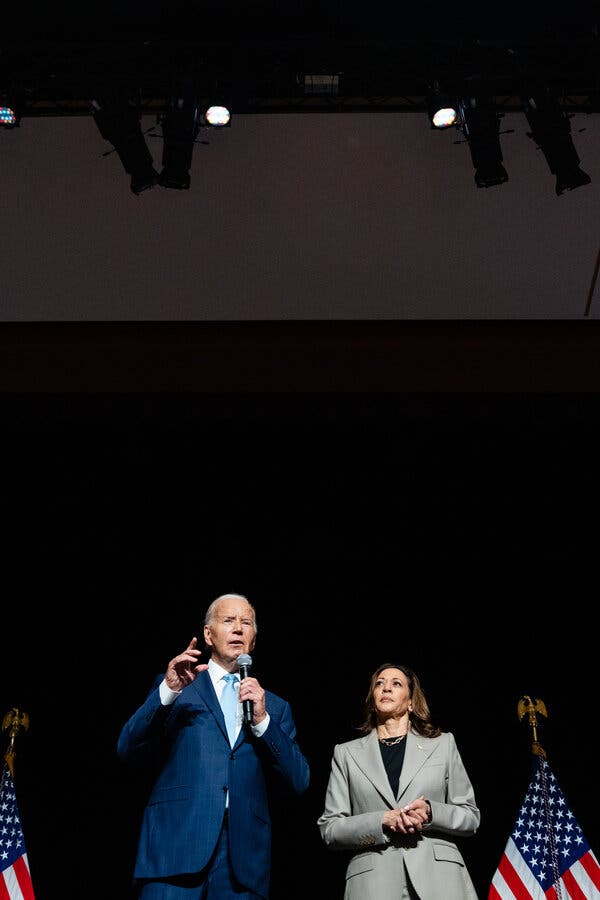Democrats Turn a Blind Eye to Biden-Harris Fiasco in 2024 Review
The Democratic National Committee (DNC) is reportedly conducting an audit into the 2024 election failures, but sources indicate that the inquiry startlingly sidesteps any critique of Joe Biden and Kamala Harris. Instead, much attention is being misplaced towards external groups that rallied behind the presidential campaign, rather than addressing the central issues surrounding the selection of the candidates themselves.
Insiders relay that the DNC’s post-election review is heavily fixated on the actions of aligned groups, while largely ignoring critical decisions made by the Biden and Harris campaigns. This shocking approach appears to discount the roles Biden and Harris played, despite their being at the helm of the Democratic campaign.
Also perplexing is that the DNC’s ‘after-action review’ will supposedly not address whether or not Biden’s decision to run for re-election was worthwhile. Furthermore, there has been no mention of exploring whether Biden’s exit from the race was timely, or if Harris was even qualified to replace him. These concerns remain unacknowledged and undiscussed.
The Harris campaign has also been spared scrutiny, despite making numerous questionable decisions that caused serious distress within the Democratic Party post-election. It is another mystifying element of the DNC’s alleged audit agenda which fails to dissect key aspects of the 2024 campaign.
The DNC officials would paint the focus of the audit as being widespread, revolving around overall election issues rather than looking critically at the Presidential campaigns. But this is seen by many as a simplistic and potentially ineffective way to avoid confronting the glaring mishaps of the Democratic leadership.
Public reviews of political defeats often tread on eggshells, as criticizing party leaders and strategists is a contentious affair. Yet, the DNC audit seems to be avoiding this important exercise entirely, causing some to question whether it is serious about learning from past mistakes.
Strikingly, the committee seems uninterested in reassessing campaign tactics or decisions, replacing direct accountability with a generalized interest in understanding why voters opted for Republicans over Democrats. However, sidestepping the investigation of the Biden-Harris campaign may prove detrimental to their claims of finding a path forward.
The Democrats appear to be in a tough spot, as they grapple with their loss of federal power. They claim to understand the message voters delivered in the 2024 elections, however, their decision to omit an examination of the Presidential campaign from the audit suggests a reluctance to genuinely introspect.
The audit was initiated in March, led by Paul Rivera, an experienced Democratic operative. But the preliminary findings reveal a glaring oversight: it does not address the crucial question of whether Biden ought to have contested the election, nor does it scrutinize Harris’s rushed, 107-day campaign following Biden’s late withdrawal.
Leaders within the Democratic Party assured that the report was not intended to critique specific campaign decisions. Yet, limitations of the report’s scope are apparent as key officials from the Biden and Harris campaigns have not been consulted, raising doubts about the comprehensiveness of the review.
The Democrats characterize this post-election review as a unifying rather than a blame-laying exercise. They stress the need for collective efforts to devise a winning strategy not only for the 2026 and 2028 elections, but long-term dominance. However, excluding direct examination of the Biden-Harris campaign calls that unity into question.
Party members propose that the problems facing the Democratic Party are deeply entrenched, pre-dating the 2024 election cycle, requiring structural changes in campaign execution. This perspective adds another layer of complexity to an already perplexing audit which bypasses the faults of a poorly managed campaign.
The DNC’s report apparently lacks the depth of the powerful ‘Growth and Opportunity Project’ report that the Republican National Committee released after the 2012 election, which recognized ideological stagnation and recommended several reforms. The DNC’s report, by contrast, appears to be on track to omit similar self-awareness and open reflection.
The Republicans took a different approach following their 2012 defeat, acknowledging their ideological blind alley and calling for moderation in contentious matters like immigration policy. Contrarily, the Democrats, in brushing aside their internal issues, seem to jeopardize their capacity for reform.
In a sign of the DNC report’s limited enquiry, several key campaign officials have not been contacted for input. If this trend continues, the DNC may end up with a report that, while claiming to look for actionable solutions, misses out on the perspectives that matter most.

